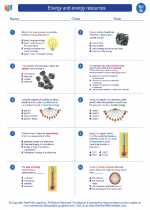Hydrological Cycle
The hydrological cycle, also known as the water cycle, is the continuous movement of water on, above, and below the surface of the Earth. It is driven by solar energy and gravity, and involves processes such as evaporation, condensation, precipitation, and runoff.
Processes of the Hydrological Cycle
- Evaporation: The process by which water is converted from liquid to vapor and released into the atmosphere from the Earth's surface, primarily from bodies of water and vegetation.
- Condensation: The process by which water vapor in the air is transformed into liquid water droplets, forming clouds in the atmosphere.
- Precipitation: The release of condensed water from the atmosphere in the form of rain, snow, sleet, or hail, which falls to the Earth's surface.
- Runoff: The flow of water over the land surface into bodies of water, such as rivers, lakes, and oceans, as a result of precipitation.
- Transpiration: The release of water vapor from plants into the atmosphere through their leaves.
- Infiltration: The process by which water on the ground surface enters the soil.
Importance of the Hydrological Cycle
The hydrological cycle is essential for maintaining the Earth's water balance and sustaining life on the planet. It regulates the distribution of water across different regions, replenishes freshwater sources, supports ecosystems, and influences weather patterns and climate.
Study Guide
To understand the hydrological cycle, it's important to focus on the key processes and their interconnections. Here are some key points to help you study:
- Describe the processes involved in the hydrological cycle, including evaporation, condensation, precipitation, runoff, transpiration, and infiltration.
- Explain how solar energy and gravity drive the movement of water within the hydrological cycle.
- Discuss the role of the hydrological cycle in regulating the Earth's water balance and supporting various ecosystems.
- Identify the factors that can influence the rate and intensity of different hydrological cycle processes, such as temperature, humidity, and vegetation cover.
- Explore the connections between the hydrological cycle and other Earth systems, such as the atmosphere, lithosphere, and biosphere.
By mastering these concepts, you'll develop a comprehensive understanding of the hydrological cycle and its significance in shaping the Earth's environment.
.





